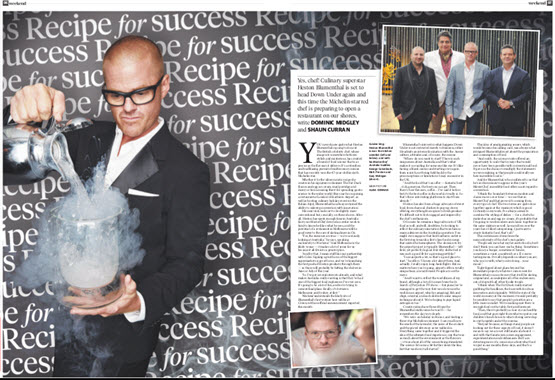
When celebrity chef Heston Blumenthal prepared to open a temporary restaurant in Melbourne, he made a big splash in the Melbourne press. In February 2014, the Herald Sun’s Weekend magazine carried an interview with the chef written by British journalists Dominic Midgley and Shaun Curran. They are not Hun journos. But it wasn’t wire copy, either. So who did the interview?
When a media outlet publishes copy from a wire agency, it usually carries the agency’s acronym (AAP, for example) to say so. Same goes with syndicated copy. With the Blumenthal interview, though, there was nothing obvious to indicate anything external about the piece. It was an exclusive chat, the copy said. But Midgley and Curran’s interview didn’t just appear in the Herald Sun. According to Interview Hub, the British agency that sold the Herald Sun the piece, it also supplied specially tailored pieces for FHM, BBC Good Food and several other food magazines around the world. It estimates 100 million people saw versions of the piece it supplied — and that’s just counting print.
In a shrinking media market, such agencies maintain a profitable niche. As newspapers and magazines cut their own budgets (and staff numbers), they are increasingly buying interviews, photographs and full-length features.
James Evans, a former magazine editor who started Interview Hub with business partner Rich Stonehouse in 2010, was happy to explain to Crikey how it all works.
In the beginning, the idea was that journalists would pitch interviews with those they could get access to, and Interview Hub would help them place that material in as many media outlets as possible. But the business has changed somewhat since then. Today, Evans says, it’s powered by publicists, who turn to the agency to help them reach multiple outlets at once with minimal use of a celebrity’s time.
What publishers get in return is access. Many niche or city-based papers can struggle to get slots with major celebrities on publicity tours, but by buying something through Interview Hub, they get someone in the room.
Evans says the agency’s journalists — some in-house, some freelancers — will often receive questions from individual publications that have pre-bought an interview, and they are able to tailor questions for every publication. Sometimes editors buy the transcript and assign an in-house journo to write it up. Other times the agency supplies a fully written feature, ready to slot into a magazine or newspaper. Where requested, Interview Hub can grant total exclusivity — with the quotes in one piece not appearing on other pieces based on the same interview.
Interview Hub counts almost every one of Australia’s major print media publishers and plenty of niche ones among its hundreds of clients, according to a client list seen by Crikey. Evans says it does the most business in Australia with Bauer Media and Pacific Magazines. The business has doubled in size in the past year — the growth partly driven by a booming content marketing division. It has an Australian investor, Andrew Burge, most well-known as the founder of magazine distributor iSubscribe.
“When editorial teams in-house get smaller, it benefits us in a sense,” Evans said. “They end up commissioning more externally. The challenge for us is to keep coming up with new editorial ideas. As long as we do that, editors will be receptive.”
Many agencies sell celebrity transcripts, photos or fully written pieces to publishers, but Interview Hub is a bit unusual in focusing on written editorial over images.
Outsourcing editorial can go badly. Earlier this month, Hello magazine retracted in its entirety an interview it had published with George Clooney, after the star said he’d never given an exclusive interview to Hello and and he’d never said the things the magazine attributed to him.
Hello issued an apology to Clooney and issued a statement blaming Famous, a British celebrity media agency that deals mostly in photographs but also in editorial content. Famous had sold Hello the interview, which (Hello said) turned out to have been cobbled together from things Clooney had said elsewhere, with a few entirely new quotes thrown in for good measure. The agency did not respond to Crikey‘s requests for comment.
Evans says that’s the style of interview his agency wouldn’t touch. But as with all things, he says it’s up to editors to check the credibility of those they’re working with.
Perhaps the biggest risk around the outsourcing of interviews revolves around journalistic independence. Interview Hub has to maintain close relationships with the publicists who grant access to celebrities. This could potentially make its journalists hesitant to ask the tough questions, or to write things that don’t fit into a celebrity’s PR strategy.
“You have to play the game, to a point,” Evans admitted.
But his firm is distinct from a PR outlet in that the point, at the end of the day, is to provide an interesting feature. Publicists and celebrities do not get a chance to read coverage before publication. And if celebrities aren’t willing to be interesting, Interview Hub can’t sell the interview on.
“Say Hugh Jackman does a film junket and only wants to talk about a film. That automatically precludes 75% of titles we can sell to, who would want to hear about his kids, or what he does on holiday, or what aftershave he’s wearing.
“People always want to read what gets behind the mask. The publicists and PRs who give us access get that. I’m not saying we can slag them off, but there is licence in any interview to push an element of who that person is. I think generally everyone understands you don’t have to toe the line completely.”








There is also the blurring of lines between “editorial” and “advertorial”. Witness Jennifer Rayner’s piece whining about being a millennial – published in both News and Fairfax publications on the same day – and being just a spruik for her book. It wasn’t identified as an advertorial like it would have been in the past.